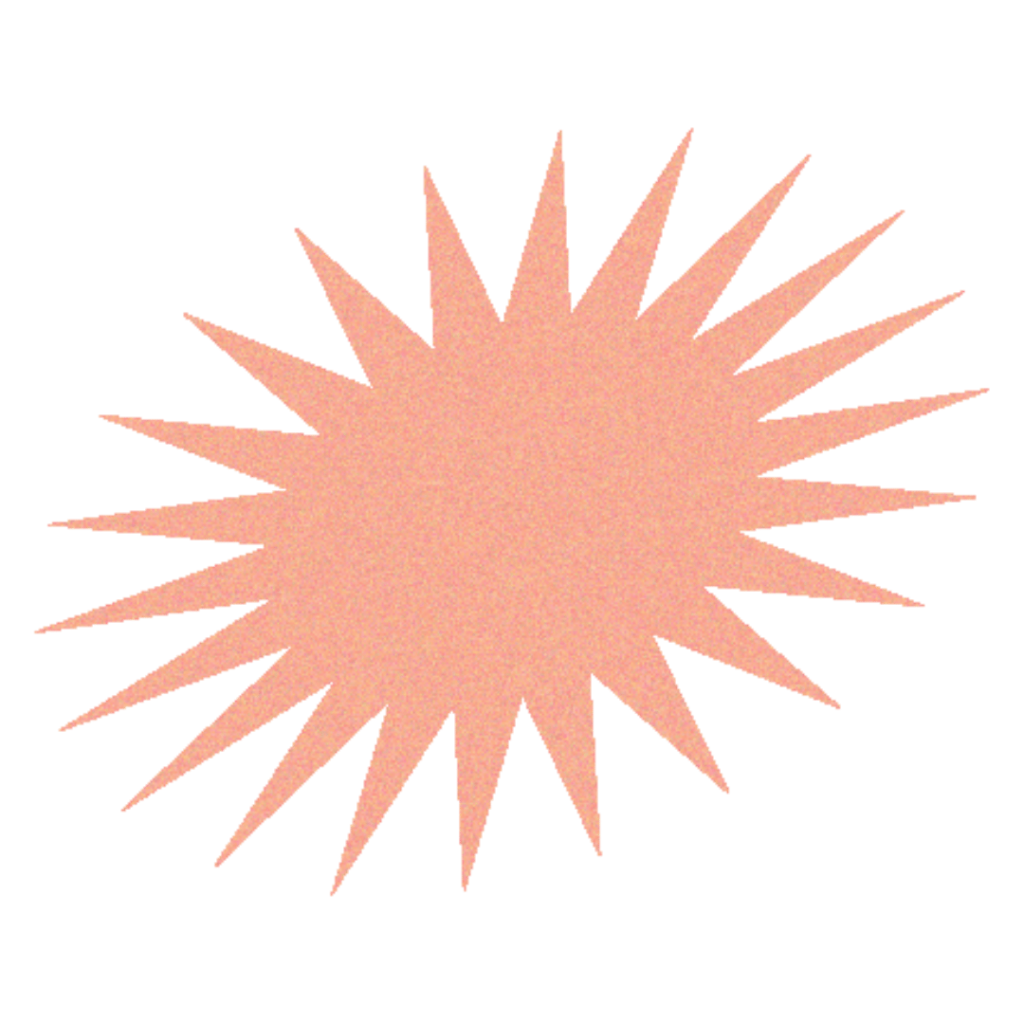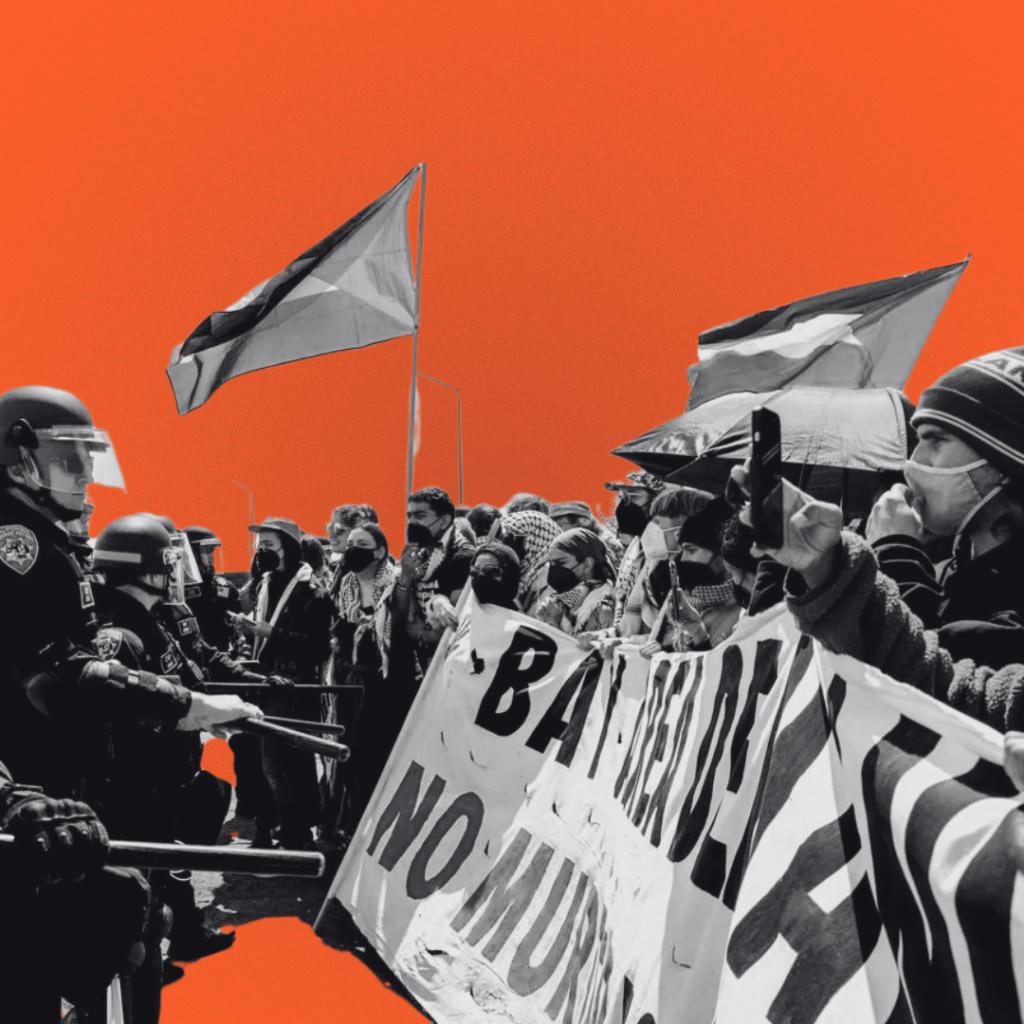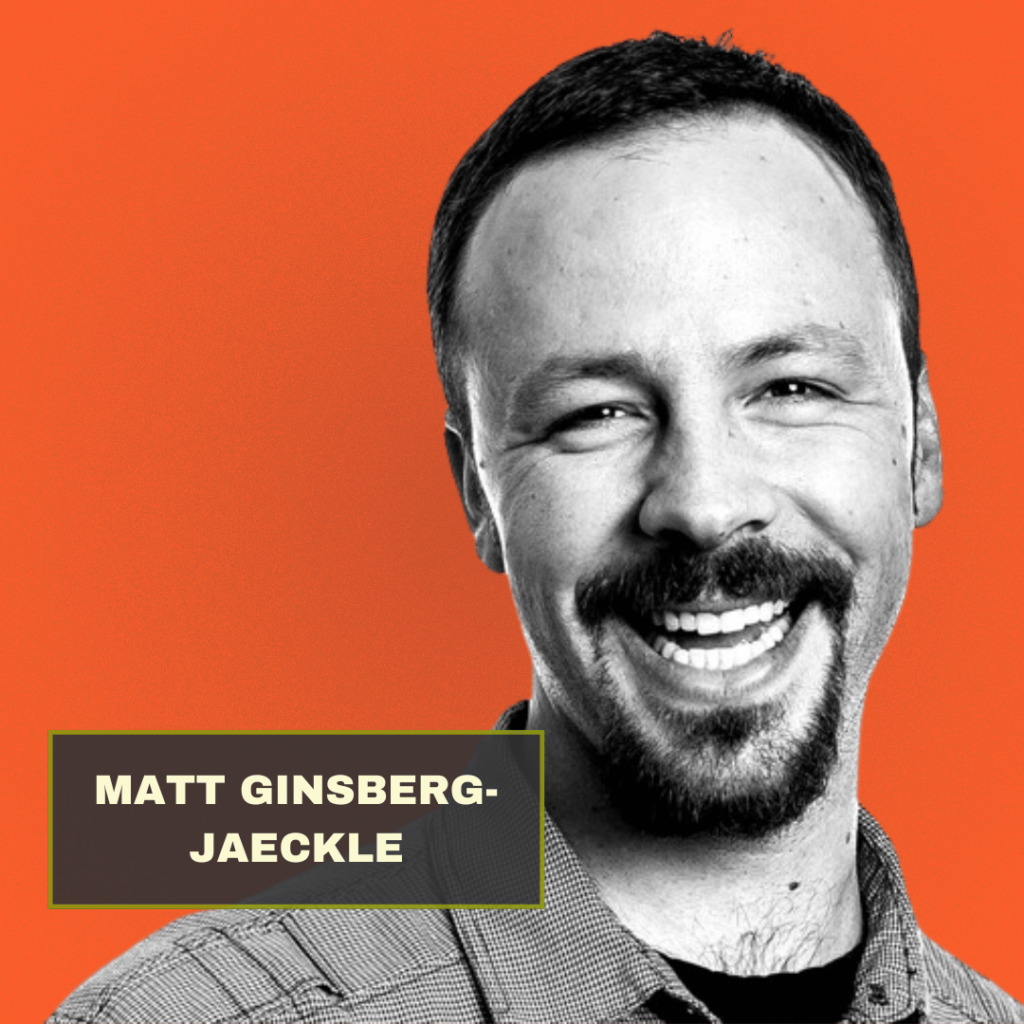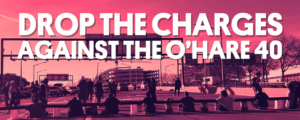
Read part two of a two-part series featuring a conversation with Matt Ginsberg-Jaeckle, Southside Together Organizing for Power co-founder and 50th Ward United Working Families member, along with some calls to action as we head into the DNC. In case you missed it, read part one.
Our rights to demonstrate and to organize our communities and workplaces are key to a functioning democracy.
They are also some of the most effective methods we have to fight back against the wealthy elite. This is why we must be vigilant in protecting ourselves from our opposition who will attempt to dismantle these rights any way that they can. The banks, finance firms, and corporate leaders who are still major power players in our city see regular people as disposable and will use any means necessary, including law enforcement, to make a profit. They target public sector workers like health providers, teachers, custodial workers and the unions who represent them because they are often the only thing standing in between them and their greed.

During August’s DNC, we have an opportunity to show the strength of our community-led movements, our labor unions, and our opposition to the catastrophic massacre of hundreds of thousands of lives abroad. We should expect that this opportunity will come with fierce opposition.
We asked Ginsberg-Jaeckle to share how his experience in 2012 can inform our strategies today.

What were your biggest lessons learned from the city’s reaction to the encampments in 2012 that you think still apply today?
On the one hand, you don’t want to close off opportunities for participation and recruitment and you definitely don’t want to fall into a culture of paranoia that can cause unnecessary internal strife, distract from organizing goals and messaging, and be a barrier to growing our movements which should be our number one priority. On the other hand, real infiltration is a major threat to our movements that can lead to entrapment and legal consequences. It also ends up pulling tons of movement energy into their defense and away from fights from justice that need to be front and center.
How do you strike the right balance in the leadup to big events like a political party convention or summit for major international financial institutions?
I would call attention to the St. Paul Principles that were drafted ahead of the Republican National Convention in 2008 where it was agreed that groups would create space and time between different tactics, and in exchange groups would agree not to call the cops on each other and not to feed into media narratives about the good protestors vs the bad protestors. Through those set of principles you create space for those who think the moment calls for more direct action and risky tactics given the scale of injustice and genocide being enabled by those inside of the conventions, and also create space for mass, family-friendly actions that don’t run the risk of unnecessarily putting ourselves in situations where there’s a risk of state oppression. We should be aware that state repression is always a looming possibility, but the St. Paul Principles help make sure we aren’t doing the state’s job and the media’s job in furthering the criminalization of protest.
What’s your advice to organizers in the frontlines about who and how you trust?
If you are in an organization that is looking to be more disruptive, the time ahead of the big event is not the time to bring new people into that tactic. We were infiltrated not because we let people in, but because we didn’t raise alarm bells. First [the infiltrating police] showed up to the public encampment after we issued a public call for solidarity, but when we had a tightly coordinated action involving civil disobedience, the infiltrators forced their way into the arrestable portion of the action to make sure they got “arrested” with us to boost their own credibility and give them access they would use to entrap other protestors. In retrospect we could have said that it was not okay that people violated the ground rules of the space and clearly delineated roles for participation.
The best paradigm to use is to not distinguish between people who are causing an internal disturbance because of their own interpersonal dynamics and life challenges and those who are causing it because they are infiltrating. Either way, we need to make our spaces safe from people who are sowing division and discord and make sure that those who are engaged in collective action have trust with each other.
Know there’s no such thing as a safe space, a safe protest or action. Weigh that against what’s at stake in this political moment and the fact that inaction won’t keep us safe either. We all have to make those assessments together.
Do you think we might see different tactics from the police and power structure today vs 2011?
We have a mayor in city hall who comes from our ranks and has been a part of our direct actions. But as we’ve seen, there are a lot of contradictions that come with power. Having a mayor and allies in City Hall won’t stop the systematic pressures on law enforcement to do what law enforcement does. There will be limits to what our allies will be able to do to reign in law enforcement so we shouldn’t make any assumptions about a dramatically better context.
We’ve gotten into a culture of using good security practices like using Signal, but at the same time, I’m the son of a public defender who used to say you should imagine anything you’re putting in writing being read back to you in court.
This genocide is the primary issue that needs to be lifted up in this political moment. It’s not enough that President Biden has stepped aside. The entire party has continued to enable a genocide and that means we need to do whatever is in our power to do. Palestinian poet Rasha Abdulhadi wrote, “Wherever you are, whatever sand you can throw on the gears of genocide, do it now. If it’s a handful, throw it. If it’s a fingernail full, scrape it out and throw.” We shouldn’t be saying that the one thing to do at this moment is x, y, or z. We should demonstrate the largest and broadest opposition possible.
Calls To Action
We must keep a clear eye on who the real power players are in our city and country and help our communities make the connection between their greed and our suffering.
We must be wary of narratives in the mainstream press that confuse us by pitting us against one another and falsely reporting that cutting the public services real people need and investing in the military and police will actually benefit us.
We must trust our gut instincts if we encounter people in our circles who try to entrap us into saying anything at all that they can use as testimony in court where it’s their word vs. our word.
Here are some concrete steps you can take today:

Contact the mayor and your alderperson telling them to drop the charges against the O’Hare 40 ahead of the DNC and to support the right to free assembly.

Join the March on the DNC on August 19 (12pm) and August 22 (5pm) at Union Park. A coalition of organizations and individuals will march on the DNC in support of the demands: Stand with Palestine and End U.S. Aid to Israel; Money for Jobs, School, Healthcare, Housing, and Environment, Not for War; Immigrant Rights and Legalization for All; Defend LGBTQIA+ & Reproductive Rights; Defend the right to unionize and strike; Stop police crimes, community control of the police now; Justice, Peace, and Equality. Learn more by visiting: marchondnc2024.org

Join Chicago Dissenters from August 17-23 for F*** The Genocidal National Convention, a counter-conference with artmaking, panels, community spaces, and parties to learn, sharpen our skills, and build our movement. You can view a full schedule of events on social media and register for events here.
